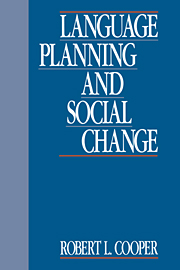Book contents
6 - Corpus planning
Published online by Cambridge University Press: 06 January 2010
Summary
Louis Henri Sullivan (1856-1924), an American architect who exerted a considerable influence on skyscraper design, wrote, in connection with the aesthetics of tall office buildings, that “form ever follows function.” Sullivan viewed the ideal relationship between form and function as organic rather than mechanical. That is, he did not believe that a design should mechanically reflect utility. Rather, he believed that an authentic style is a natural expression of the civilization in which it is rooted. Thus an architectural design should express the environment from which it evolves as well as the particular functions it is meant to serve (Koeper 1980).
Although the dictum that form follows function was derived from a theory of architectural aesthetics, perhaps it can be applied to corpus planning. Certainly architecture serves as an apt metaphor for the latter. Both the architect and the corpus planner design structures to serve particular functions, rooted in a given social, cultural, political, and historical context. Both the architect and the corpus planner are influenced by this context. Both the architect and the corpus planner operate with an aesthetic theory, implicit or explicit. For example, just as Sullivan believed that a structure should reflect the civilization from which it springs, so some corpus planners believe that the corpus should reflect an indigenous or a classical tradition, or the values of modernity, efficiency, transparency, and the like.
- Type
- Chapter
- Information
- Language Planning and Social Change , pp. 122 - 156Publisher: Cambridge University PressPrint publication year: 1990



